Related
Topics
Guests
- Belkis Willeassociate director with the Crisis, Conflict, and Arms Division at Human Rights Watch.
Human Rights Watch has documented ethnic cleansing in the West Darfur region of Sudan by the paramilitary Rapid Support Forces and allied militias against the Masalit people and other non-Arab communities. “These allied militia and the RSF then, from April until June, conducted a rampage of killings, of lootings, of torture, of rape,” says Belkis Wille, associate director with the Crisis, Conflict, and Arms Division at Human Rights Watch. She says international actors must cut off the flow of arms to all warring parties, but adds there is little “political will” to enforce an arms embargo in Sudan.
Transcript
NERMEEN SHAIKH: Well, Belkis, we want to turn now to a conflict that is very rarely covered, and certainly not covered to the extent that it should be, which is in Sudan, where a humanitarian catastrophe in North Darfur is escalating, as Human Rights Watch has documented. On Wednesday, the United Nations humanitarian coordinator for Sudan said people are, quote, “trapped in an inferno of brutal violence” between the army and paramilitary forces, which has made it hard to deliver aid, and now, quote, “famine is closing in” for more than 4 million people. Also on Wednesday, the United States imposed sanctions against two commanders of Sudan’s paramilitary Rapid Support Forces.
This is human rights lawyer Jamal Abdallah Khamis describing how he nearly escaped a massacre orchestrated by the Rapid Security Forces, or RSF. He spoke in a video for a new Human Rights Watch report titled “Sudan: Ethnic Cleansing in West Darfur.”
JAMAL ABDALLAH KHAMIS: [translated] I was accompanying my injured friend, Yousef Haroun Kabello. Minutes later, around eight militiamen wearing Rapid Support Forces uniforms appeared. There were others with them from these well-known Arab militias. They were arguing with people. They stopped the cars. They opened fire on us. They shot at the chests of children, women, old and young men. It was a harrowing scene. We thought about how to escape. But we needed a way to escape. How were we going to escape? They started chasing people down the valley and firing on people who were in the water. It was terrifying.
NERMEEN SHAIKH: So, Belkis Wille, that was an excerpt from the video that accompanied your report, Human Rights Watch’s report on Sudan. If you could talk about the key findings in the report and why Human Rights Watch has concluded that the RSF may have committed genocide?
BELKIS WILLE: So, this report is about a period last year between April and June, and then subsequently in November. And we’ve centered the report around events that occurred in the capital of West Darfur, the city of El Geneina. The reason we focused there is because though there has been fighting across Sudan since last April, when there was a split between the Sudanese Armed Forces and the Rapid Support Forces, the RSF, the violence has been perhaps most acute there. And this is, you know, an area that since 2003 has faced waves of violence and horrific killings.
Last April, with this split and fighting that developed in Khartoum, the capital, we saw the RSF proceed to encircle the city of El Geneina, where there was a limited presence of the Sudanese Armed Forces. They pulled out of the city at that point, leaving civilians in the city to the hands of the RSF. The RSF brought in allied militia. And these allied militia and the RSF then, from April until June, conducted a rampage of killings, of looting, of torture, of rape, targeting a specific ethnic group, the Masalit population, and a few other specific ethnic groups. And this was a campaign, as you say, of ethnic cleansing that we saw conducted over about six weeks.
And over that time, these armed forces encircled this population, pushing them into a smaller and smaller sector of the city, and then ultimately pushed them out of the city in one mass wave of killing, where you had tens of thousands of people on the streets, mostly Masalit, walking, trying to get to safety, and Rapid Support Forces along the sides of the road just opening fire and shooting them. People started running. They jumped into the river, which was deep. They were drowning. As they were drowning, they were being shot and killed. Some then turned around and ran in the direction of the border with Chad. And they, along that road, were also rounded up by forces, and many were killed.
At the end of last summer, my colleague and I interviewed dozens of survivors of this violence. We ended up interviewing 200 or so. And they shared with us horrific details about these killings. And it’s really important that states focus on the acuteness of this violence and focus on examining whether indeed there was intent to commit genocide by the RSF and whether there should be prosecutions for genocide.
AMY GOODMAN: And, Belkis Wille, if you can explain: Who is arming both sides? I mean, we’ve just passed the first anniversary of this conflict between the Sudanese military and the RSF, who were together before this. And explain who the leaders are and the countries on both sides.
BELKIS WILLE: Unfortunately, this is an incredibly murky picture. We have different governments providing arms to either side of these groups. We ourselves have been trying to track some of these arms transfers, because, of course, the more that weapons continue to get poured into this conflict, the more the fighting will continue and the more civilians will pay the price.
I think what’s perhaps the most notable, though, is actually the lack of action to protect civilians, whether that’s by the U.N. Security Council or by the African Union. You know, there was a U.N. mission of peacekeepers that was based in Sudan, and their mission ended in 2020. A new mission was created by the U.N. that had no peacekeeping or protection of civilian mandate. It was only a, you know, political negotiations mission. But even that closed at the end of last year, last November. So, at the moment in Sudan, there is absolutely no entity that is focused on the protection of civilians.
And so, what we’re calling for in this report is a new mission, that needs to be created both by the U.N. and the African Union, sent into Sudan with a mission to protect civilians. And at the same time, we need to see an effective arms embargo. Currently there’s an arms embargo in place in the context of Darfur. It’s not being complied with. As you said, there are different states pouring weapons into the country. And that needs to be complied with in order to better protect civilians.
If I may just add one thing, which is there is another city, a city in northern Darfur, which you mentioned, El Fasher. That city, as of this morning, is in flames in the eastern part of the city. We saw satellite imagery from two days ago showing that the RSF has encircled the city and that there are fires developing in civilian neighborhoods. And this is a city that’s been housing tens of thousands of people who have been displaced from fighting in other parts of Darfur.
NERMEEN SHAIKH: Belkis, as you mentioned, there is an existing arms embargo. So, if you could say, I mean, how is an arms embargo normally enforced, and why hasn’t it been enforced in this case? And what are the countries that are violating the arms embargo consistently? Outside powers who are involved in this conflict include the United Arab Emirates, Iran, Egypt and, no doubt, others.
BELKIS WILLE: Absolutely. So, you know, I mean, the effectiveness of arms embargoes really comes also from political will to impose those arms embargoes, political will on the sides of states not to send weapons to specific conflict zones, but then also on the side of the international community, the watchdog community, the U.N. Security Council, to hold states accountable when they are breaking that arms embargo. And that’s something that we’re not seeing happening in the context of Darfur specifically.
You mentioned the name of a few states, like the United Arab Emirates and others, that are shipping weapons into this conflict and context. But, as I said, it’s extremely murky. There is limited tracking of what kind of weapons are being brought into the country and how they’re being used by these warring parties — exactly the reason that, indeed, there should be an arms embargo, a complete arms embargo, in place that is being effectively enforced by the U.N. and the global community.
NERMEEN SHAIKH: And, Belkis, if you could say, you know, just outline what the scale of the crisis is for refugees and internally displaced people in Sudan. A new report from the International Organization for Migration has found 20,000 people are forced to flee their homes in Sudan every day — 20,000 people every day, half of them children. What do you think needs to be done to help these people get to a place that’s safe?
BELKIS WILLE: As you say, I mean, the scale of the conflict really can’t be understated. We have areas in the country that are approaching famine. We have areas of the country, like Darfur, where the violence and the conditions have been so bad and the violence so acute that over half a million people have had to flee across the border into Chad. We’ve seen many people have to flee to other neighboring countries, including South Sudan and elsewhere. So, it really speaks to the horrifying situation that civilians are facing.
Unfortunately, as long as the fighting continues and as long as there is no entity to put in place, you know, a civilian protection strategy, we’re going to continue to see the conditions that you’re describing. There are so many areas that are completely outside of the access of aid groups and aid workers. So those are areas where there’s no way to bring food or medicine or water in. And that’s because of the warring parties. The RSF and the Sudanese Armed Forces are blocking access for aid workers into these areas. They’re blocking civilians from fleeing from certain areas. And that’s really the context of the conditions you described.
AMY GOODMAN: Belkis Wille, we want to thank you so much for being with us, associate director with the Crisis, Conflict, and Arms Division at Human Rights Watch, speaking to us from the capital of Ukraine, from Kyiv.
And speaking of international human rights, the International Court of Justice today is hearing from South Africa, their request over the Israeli assault on Gaza’s southern city of Rafah. We’ll have more on that tomorrow. I’m Amy Goodman, with Nermeen Shaikh, for another edition of Democracy Now!
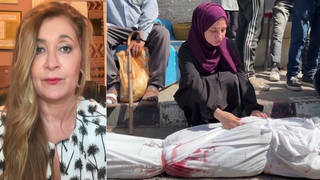
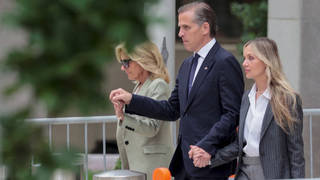
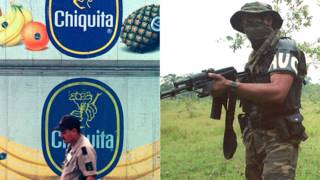
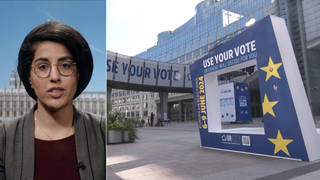

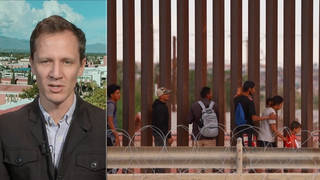
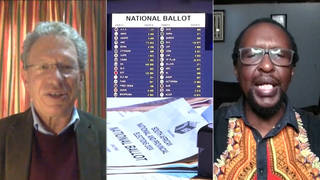
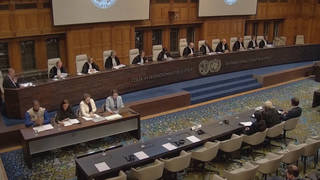

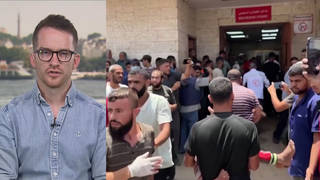
Media Options